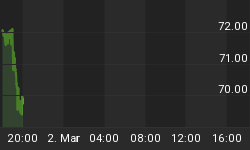It is axiomatic that central banks can control interest rates or exchange rates - not both. As of late, they are falling over themselves to signal their willingness to sacrifice exchange rates. Let there be no doubt on this point - central banks have an unblemished track record in only one area and that sadly is currency devaluation. The US dollar has experienced a 97% loss in purchasing power since the inception of the Federal Reserve and the Canadian dollar a 95% loss since the inception of the Bank of Canada.
Official wisdom seems to be that a devaluation driven by enormous increases in the money supply is necessary for the US to grow out of its recession. Unfortunately, the US is pursuing this policy at the same time that the over 90 countries that run a current account surplus with the US are trying to maintain export competitiveness via their own fledgling devaluation programs. ZIRP is a global phenomenon.
A new area of mercantilism and competitive currency devaluations is clearly upon us and the consequences will be a global loss of purchasing power. US policy does beg the simple question - if people could be made wealthy by debasing the currency wouldn't the Argentineans and the Zimbabweans (fill in your favorite currency failure here) be the richest people on the planet?
Now to the unintended consequences. We are witnessing something akin to a positive feedback loop in the global monetary system. With each massive injection of freshly created money, the system becomes increasingly unstable. The end result is that every effort to fix the problems with more of the same QE merely creates another larger problem, hydra like, elsewhere. In turn, each new problem is attacked with a larger dose of fresh money and so on and so on... repeat until bankrupt or in stagflation.
This brings me to the main point of this letter - and I promise there is one. ZIRP is effectively throwing pension plans and savers onto the bonfire of the banking system. What I mean by this is that low interest rates have created a huge stealth subsidy that is being donated to the banking system.
How are pension plans being effected you may ask? The issue arises because a significant number of pensions assume annual returns in the range of 8% when they are planning how to meet their obligations. As a large portion of pension portfolios are in fixed income securities that are now yielding a fraction of that number, these return assumptions are aggressive to put it mildly. The longer ZIRP continues the worse the problem will become. Ultimately, benefits will have to be reduced and/or large amounts of additional capital in the form of higher contributions will have to be collected. Barring this pensions will go bankrupt.
Just how serious is this funding shortfall problem? A recent pair of US studies on municipal and state pension obligations by the Kellogg School of Management reveals the magnitude. By performing independent calculations on governments' raw numbers, it was concluded that the unfunded obligations of municipal pensions were more than double the officially reported figures. By the municipalities' accounting, they had a total of $190 billion in unfunded obligations while the study put the actual amount at $383 billion. But wait it gets much worse. The second Kellogg study found a state-funding gap of $3.2 trillion - for a grand total at the municipal and state levels of around $3.5 trillion - more than the banking bail-out to date.
Retirees who have been promised benefits are going to exert powerful political pressure to be paid in full. Unfortunately, it does not appear that there will be enough cash to pay them and stay solvent. Once again, the federal government is likely to step in and bailout the pension system with more freshly printed money - QE 3 and 4 anyone?















